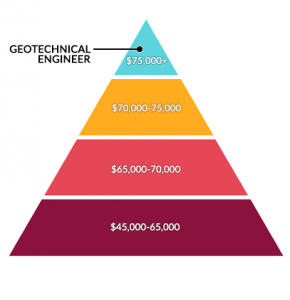The Best Guide To Geotheta
The Best Guide To Geotheta
Blog Article
Things about Geotheta
Table of ContentsGeotheta for BeginnersThe Single Strategy To Use For GeothetaThe Ultimate Guide To GeothetaEverything about GeothetaThe Only Guide to Geotheta

They perform website investigations, accumulate examples, carry out laboratory examinations, and evaluate information to examine the suitability of the ground for construction tasks - Tailings Engineer. Based upon their searchings for, geotechnical designers supply recommendations for structure design, slope stability, preserving frameworks, and reduction of geotechnical threats. They collaborate with various other experts, such as engineers, architectural engineers, and building teams, to make sure that geotechnical factors to consider are integrated right into the total job style and application
By evaluating the behavior and residential or commercial properties of dirt and rock, they can determine prospective geotechnical risks such as landslides, dirt settlement, or slope instability. Their know-how aids prevent failings or crashes that can threaten lives and home. Right here are some thorough obligations and duties of a geotechnical engineer: Site Investigation: Geotechnical designers conduct website examinations to collect information on subsurface conditions.
They translate the data to recognize the homes and actions of the soil and rock, including their stamina, permeability, compaction characteristics, and groundwater problems. Geotechnical Analysis and Design: Geotechnical engineers analyze the information collected throughout website investigations to evaluate the security and viability of the site for building jobs. They perform geotechnical calculations and modeling to examine variables such as birthing ability, negotiation, incline stability, lateral planet stress, and groundwater flow.
The Ultimate Guide To Geotheta
Structure Layout: Geotechnical designers play an important duty in designing foundations that can safely sustain the desired structure. They examine the dirt problems and tons requirements to determine the suitable foundation kind, such as superficial foundations (e.g., grounds), deep foundations (e.g (https://geotheta.blog.ss-blog.jp/2024-08-02?1722614750)., heaps), or specialized techniques like dirt enhancement. They consider variables such as settlement limits, bearing capability, and soil-structure communication to establish optimum foundation layouts
They examine building strategies, display website activities, and carry out field examinations to validate that the design referrals are adhered to. If unanticipated geotechnical concerns occur, they examine the scenario and offer recommendations for remediation or adjustments to the design. Threat Assessment and Reduction: Geotechnical engineers assess geotechnical threats and dangers connected with the project website, such as landslides, liquefaction, or soil erosion.

Partnership and Communication: Geotechnical engineers function very closely with various other experts associated with a task, such as engineers, structural engineers, and building and construction groups. Reliable interaction and collaboration are important to integrate geotechnical considerations into the overall project style and building and construction process. Geotechnical engineers provide technical know-how, response questions, and guarantee that geotechnical demands are satisfied.
Geotheta for Dummies
Below are some types of geotechnical engineers: Structure Engineer: Foundation engineers concentrate on making and assessing structures for structures. They assess the soil problems, load requirements, and site attributes to identify the most ideal foundation type and design, such as shallow structures, deep structures, or specialized techniques like heap structures.
They examine the elements influencing slope stability, such as soil residential or commercial properties, groundwater conditions, and incline geometry, and establish approaches to avoid incline failings discover this info here and minimize dangers. Quake Designer: Quake engineers specialize in assessing and developing frameworks to hold up against seismic forces. They evaluate the seismic threat of a website, review soil liquefaction capacity, and establish seismic layout requirements to ensure the safety and security and resilience of frameworks throughout quakes.
They perform field screening, collect examples, and analyze the accumulated information to define the dirt homes, geologic developments, and groundwater conditions at a website. Geotechnical Instrumentation Engineer: Geotechnical instrumentation engineers concentrate on tracking and measuring the actions of soil, rock, and frameworks. They set up and keep instrumentation systems that keep track of variables such as soil settlement, groundwater degrees, slope motions, and structural variations to analyze performance and supply very early cautions of possible issues.
Geotheta Things To Know Before You Get This
They carry out tests such as triaxial tests, loan consolidation tests, direct shear tests, and permeability tests to gather data for geotechnical evaluation and layout. Geosynthetics Designer: Geosynthetics designers concentrate on the style and application of geosynthetic materials, such as geotextiles, geogrids, and geomembranes. They use these products to boost dirt stability, enhance inclines, provide drainage options, and control erosion.
They often tend to be investigatory people, which implies they're intellectual, reflective, and analytical. They are interested, systematic, reasonable, analytical, and rational. Some of them are additionally social, meaning they're kind, generous, participating, person, caring, practical, compassionate, tactful, and friendly - Geo Tech Engineering.
In the office atmosphere, geotechnical engineers make use of specialized software program devices to do computations, produce designs, and assess data. They prepare reports, testimonial task specs, communicate with clients and group members, and coordinate project tasks. The office setup gives a favorable environment for research, evaluation, and partnership with other specialists entailed in the project.
The Best Guide To Geotheta
They often see project sites to perform site investigations, assess geotechnical problems, and collect data for analysis. These check outs include taking a trip to various locations, in some cases in remote or tough terrains. Geotechnical designers may perform dirt sampling, conduct tests, and monitor building and construction tasks to guarantee that the geotechnical facets of the task are being executed appropriately.
Geotechnical engineers likewise operate in specialized geotechnical research laboratories. In these facilities, they perform experiments, execute examinations on dirt and rock examples, and examine the design properties of the materials. Geotechnical research laboratory designers work extensively in these environments, dealing with screening equipment, running instruments, and tape-recording information. They work together with various other lab team to guarantee exact and reputable screening results.
Report this page